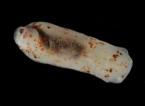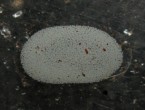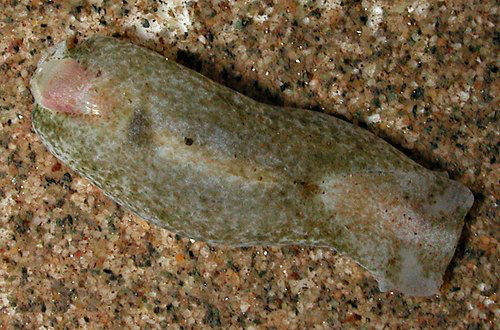_______________
Additional Photos

underside

brown

young, 2 mm

fully extended

shell

egg mass
_______________
GALLERY

|
Phanerophthalmus perpallidus Risbec, 1928

Maximum size: 19 mm.
Identification:
This
species has a translucent shell with a greatly expanded aperture
and low spire. Although the shell is external, it's only about one
fourth the length of the body and is partially covered by the
parapodia. The animal is translucent cream. When young, it has
scattered
brown spots on the body with orange spots showing through the shell.
When mature, it becomes densely blotched with brown to olive-green and
the spots showing through the shell fade to light brown. It may be
distinguished from the other members of the genus by its relatively
large shell.
Natural history:
Phanerophthalmus
perpallidus is a common nocturnal species found in protected to
highly exposed rocky and back-reef habitats at depths of < 1 to 3 m
(< 3
to 10 ft). Rarely, it can be found in Halimeda
kanaloana beds at depths of 9 m (30 ft) or more. According to Kay (1979), it rests by day among the holdfasts of Vallonia. It lays a
lozenge-shaped, white egg mass with densely packed eggs. The mass is
attached by an adhesive surface and hatches in three to four days in
the laboratory.
Distribution:
Big Island, Maui, Oahu, Kauai and Midway: widely distributed in the Pacific.
Taxonomic notes:
This species is listed in Kay, 1979 as Phanerophthalmus cylindricus (Pease, 1861). However, the
drawing of it in Kay, 1979 is mislabeled as Phanerophthalmus
smaragdinus. Although it appears to be the species listed as P. cylindricus in Kay, it doesn't appear to match the original description of that species from Tahiti. It's also probably listed as both Phanerophthalmus cf. cylindricus and Phanerophthalmus cf. smaragdinus
in Severns, 2011 (it's likely that both illustrated shells fall within
the range of variation for this species). In addition, the live photo of
Haminoea cymbalum on page 418 is mislabeled as Phanerophthalmus cf. cylindricus.
Photo: CP:
green; 12 mm: Hekili Point, Maui; Nov. 30, 2004.
Observations and comments:
Note
1: ( )
|
|







